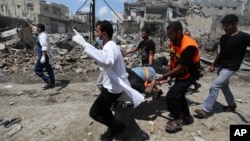Palestinian officials in Gaza say more than 60 people were killed during Israeli military operations over the past 24 hours, making it the most deadly period since the latest conflict began July 8. More than 400 Palestinians have been killed in Operation Protective Edge, Israel's military response to Hamas rocket attacks.
Israel escalated air, ground and naval assaults Sunday, targeting militant sites in northern Gaza.
Military forces began pounding the Shijaiyah neighborhood overnight, leaving civilians dead in the streets and reducing buildings and infrastructure to rubble.
An Israeli military spokesman, Captain Eytan Buchman said Israeli forces faced heavy resistance from militants in the area.
"This is not your standard Gaza suburb, this is a fortified area. There is literally an entire underground network, we discovered 10 terror tunnels dug underground. We encountered anti-tank missiles, RPGs and light-arms fire fired from windows and fired from residences inside of Shijaiyah," he said.
Israel is seeking to destroy the military capabilities of the Hamas Palestinian group that controls Gaza by targeting tunnels being dug into Israel and sites used to launch rockets across the border.
Local and international agencies say the majority of those killed in the Israeli operations have been civilians, with a large number of children among the dead.
The Israeli military warns Palestinians of impending operations, and accuses Hamas of using civilians as human shields.
Kerry Blames Hamas for Continued Conflict
U.S. Secretary of State John Kerry is blaming Hamas for the continued fighting in the Gaza Strip.
In a string of television interviews Sunday, the top U.S. diplomat said the Hamas militants have "stubbornly" refused to accept a cease-fire to stop the nearly two-week conflict.
Kerry defended Israel's right to defend itself against the barrage of missiles Hamas has fired into the Jewish state, which sent ground forces into Gaza three days ago. Kerry said Hamas "invited further actions" by the Israeli military with the rocket attacks.
He described the situation in Gaza as "ugly," but said that Hamas needed "to recognize their own responsibility."
Hamas has rejected a cease-fire plan offered by neighboring Egypt. Kerry said U.S. President Barack Obama will ask him soon to go to the Middle East to see if he can broker a cease-fire.
Central hospital overwhelmed
The central hospital in Gaza is reportedly overwhelmed by the number of wounded coming in ambulances, cars and trucks, mostly from Shijaiyah.
Gaza resident Anas Hamra, who lives on the coast of the territory, told VOA he and his family huddled together in one room during the previous night, which he described as "the most terrifying" period since the operations began.
"No one is safe, nowhere is safe. Because you move, you are a potential target by the airstrike or by the drones, or even by the Israeli navy," said Hamra.
Israel agreed to a temporary humanitarian truce Sunday to allow Palestinians to collect the dead and wounded, following a request mediated by the International Committee of the Red Cross. The Israeli military says militants violated the cease-fire by continuing to fire on Israeli forces.
The United Nations says more than 60,000 people have taken refuge at shelters across Gaza City.
U.N. Secretary-General Ban Ki-moon is beginning a trip to the Middle East with a stop Sunday in Qatar in an effort to encourage a comprehensive cease-fire deal. From Qatar, he will go to Kuwait City, Cairo, Jerusalem, Ramallah and Amman.




